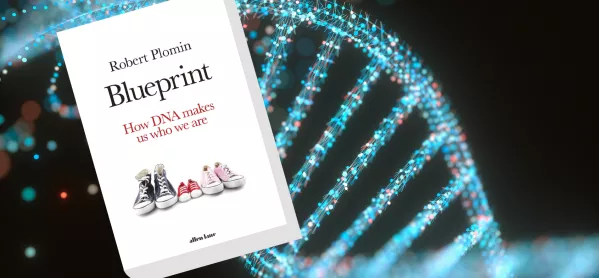
- Home
- Book review: Blueprint, by Robert Plomin
Book review: Blueprint, by Robert Plomin

Blueprint: How DNA makes us who we are
By Robert Plomin
Allen Lane
288pp
£20.00
ISBN 9780241282076
Robert Plomin has been waiting 30 years to write Blueprint. He admits that the main reason for the wait was something very human: cowardice. Now, he feels, is the right time to publish.
You have to question his timing, because, in an age that sees emotions and lived experience as the main authors of identity, anything that resembles genetic determinism is as countercultural as a European flag on a Brexit demonstration.
Plomin warns us in his introduction that “my goal is to tell the truth as I see it, without pulling punches for the sake of perceived political correctness”. Well, he’s certainly done that.
If anyone is going to write a book that challenges deeply held beliefs about who we are, it is Plomin: a psychologist with 45 years’ experience in research, but with an undimmed passion for his subject.
For him, “DNA isn’t all that matters but it matters more than everything else put together in terms of... who we are”. Such a statement is uncontroversial, and could have been written at the start of his career.
But what has recently changed is that we are able to analyse not only the “big effects” in DNA but also the “thousands of small differences” that create “powerful predictors of psychological traits”. This genome-wide association study arms us with “polygenic scores” that can be used to explain psychological traits. We are now at a historical turning point in this science, and the implications are vast.
And no more so than in education, because the “best predictors” are for schizophrenia and school achievement, a coupling that is not often referred to outside more troubling end-of-term reports, but is here.
After reading Blueprint, you get used to statements that challenge you to look again at the profession, and at yourself as a teacher. Statements such as “schools matter, but they don’t make a difference” are deliberately provocative: anything that makes a difference matters, although Plomin argues that educational outcomes are largely decided not by schooling, but by heritable qualities.
And those educationalists who try to convince us otherwise - that we have to be “tigers” as parents, or instil our children with “grit” if they are to succeed - are “peddling snake oil”. So much for Amy Chua, Angela Duckworth and Carol Dweck.
For Plomin, schools do matter “in that they teach basic skills such as literacy and numeracy”, as well as science, history and other subjects. But in terms of academic outcomes, their impact should not be overestimated.
If, as he claims, inherited DNA differences account for more than half of the differences between children in their school, then it is here where relative success or failure can be found.
Plomin is careful to state that “genes are not destiny”: people change, and make progress in some subjects, but heritability means that some find change in certain areas much more difficult than others. Ignoring the advice given out in millions of assemblies every year, Plomin argues that positive thinking, or practising for 10,000 hours, won’t make much difference for many children. Or, quoting WC Fields: “If at first you don’t succeed, try, try again. Then quit. There’s no use being a damn fool about it.”
Even trying to create a system that is fairer is destined to fail because “equal opportunities cannot be imposed on children to create equal outcomes”, as genetic differences will decide who takes advantages of those opportunities. Or, as he writes in his characteristically pithy way: “opportunities are taken, not given”. Trying to manipulate selection, or measure progress, are activities that assuage our desire to see improvement, but are mostly superficial: “inequality in outcome is not going to be tackled indirectly through the educational system”, a statement that could be both liberating in its realism, or depressing in its fatalism.
But Plomin isn’t denigrating teachers or teaching; in many ways wants to see schools less obsessed with league tables and more human in their focus. But what he is calling for is a greater discussion of this research, especially among educators. Because ironically, in a profession that seeks to understand and convey understanding, “education is the field that has been slowest to absorb the messages from genetic research”.
Given that the implications for schools could be so profound, that is unsurprising, but that shouldn’t stop us engaging with his arguments. We need to not only find out what works, but why it works (and, equally important, why it doesn’t). “Genetics,” Plomin writes, “is much too important to leave to geneticists alone.” It is a subject in all of us, and we need to own it and shape its educational destiny.
David James is deputy head (academic), Bryanston School. He tweets @drdavidajames
You can support us by clicking these links: we may earn a commission from Amazon on any purchase you make, at no extra cost to you
Register with Tes and you can read five free articles every month, plus you'll have access to our range of award-winning newsletters.
Keep reading for just £4.90 per month
You've reached your limit of free articles this month. Subscribe for £4.90 per month for three months and get:
- Unlimited access to all Tes magazine content
- Exclusive subscriber-only stories
- Award-winning email newsletters
You've reached your limit of free articles this month. Subscribe for £4.90 per month for three months and get:
- Unlimited access to all Tes magazine content
- Exclusive subscriber-only stories
- Award-winning email newsletters



